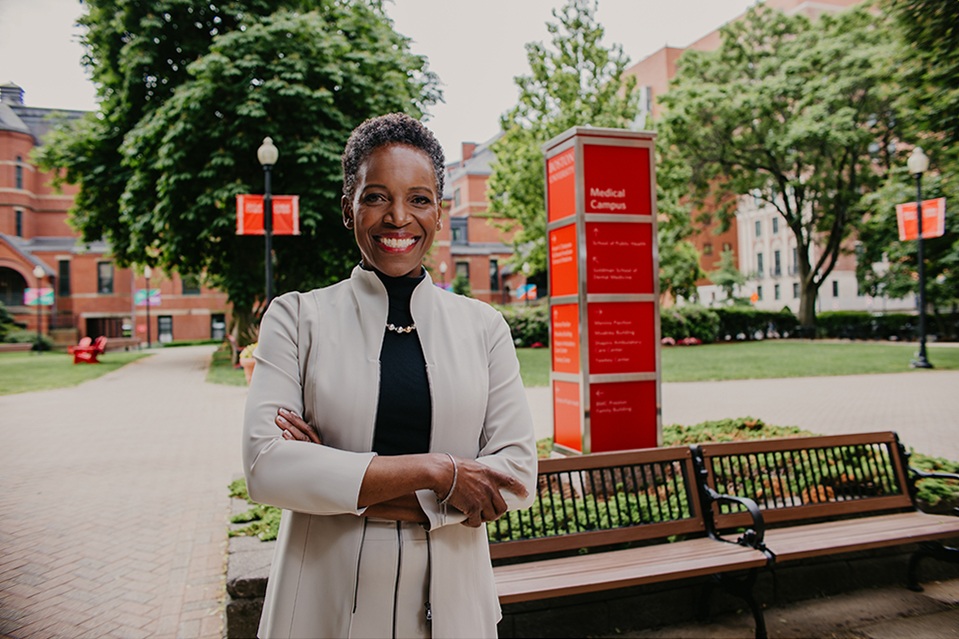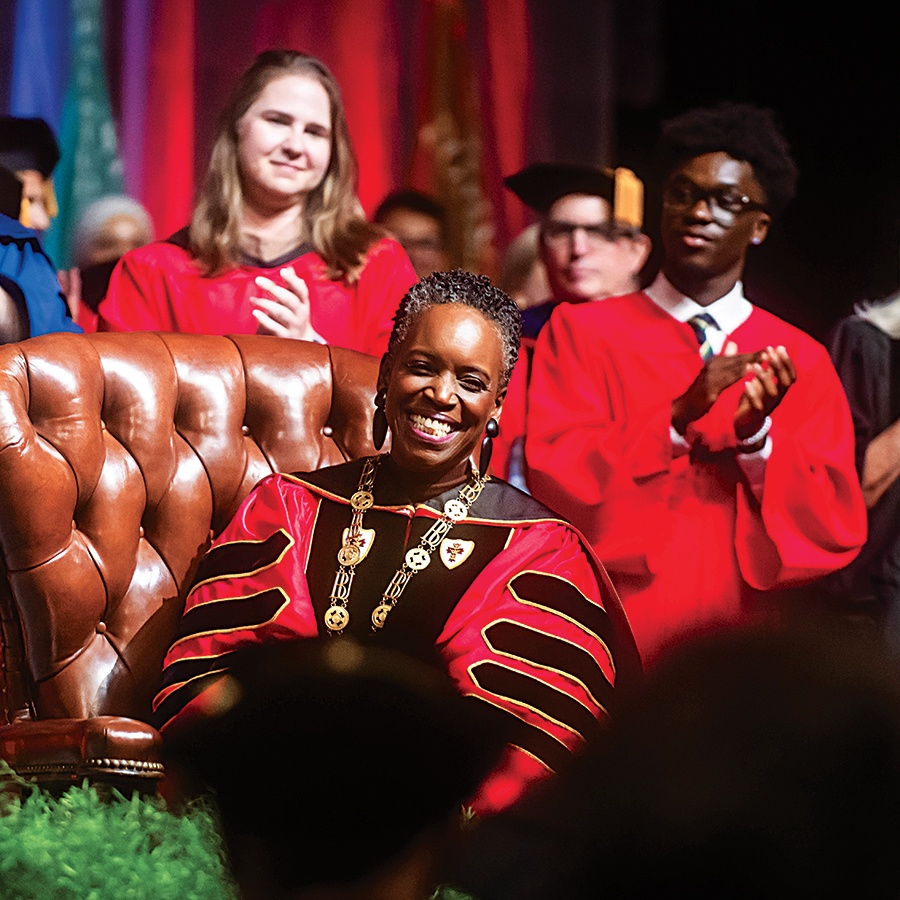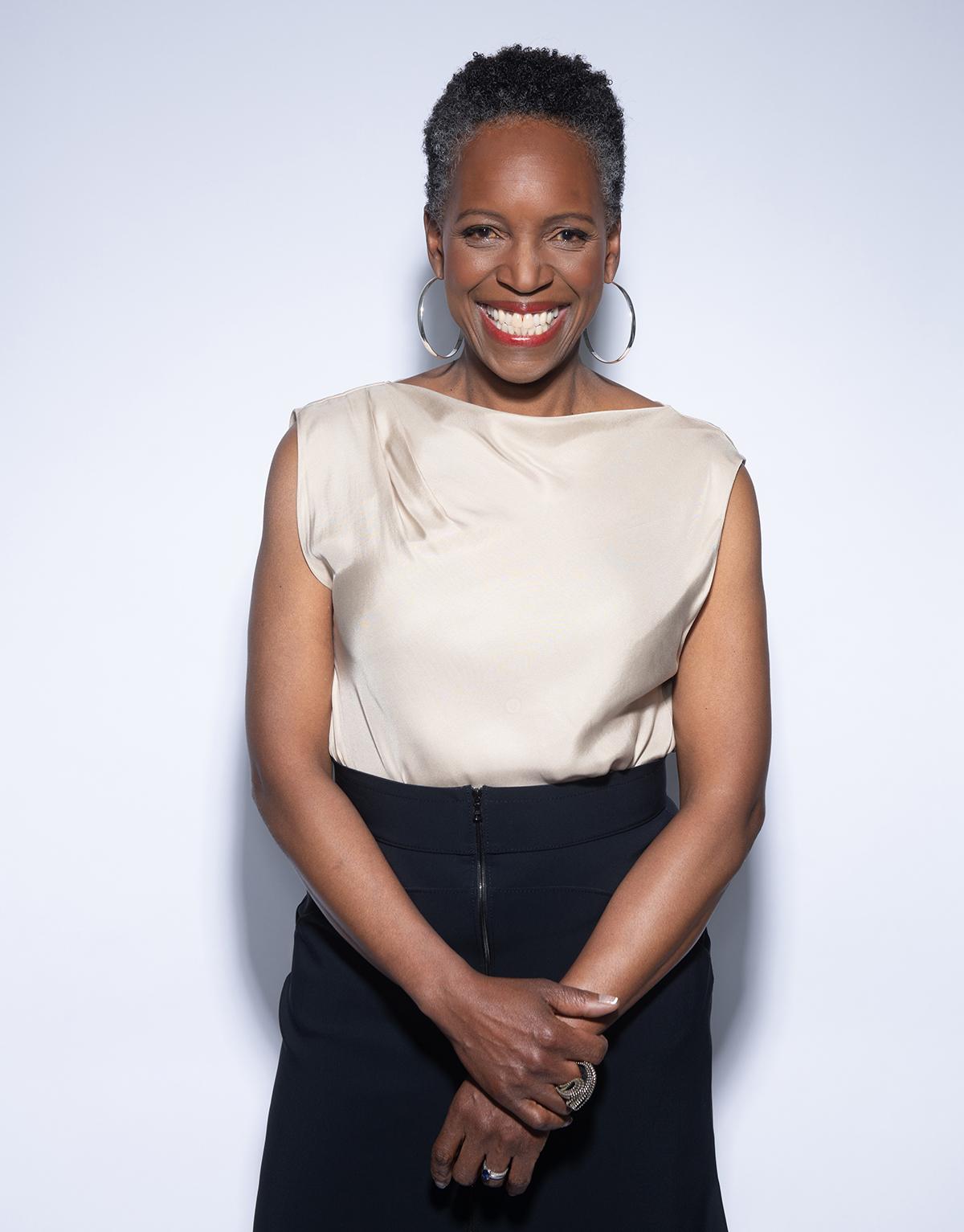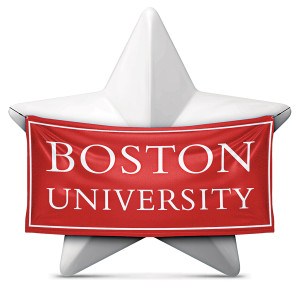Fresh off her summer inauguration, Melissa Gilliam talks campus protests, Roe v. Wade’s repeal, and becoming a newly minted Terrier fan.
Photo by Janice Checchio for Boston University Photography
Most teens dream of celeb encounters. Melissa Gilliam? She spent time as a kid lounging on Justice Ruth Bader Ginsburg’s living room couch (perks of her friend’s mom being a judicial icon). But for this Washington, DC, wunderkind, rubbing elbows with the Notorious RBG was just the opening act. Fresh from her stint as Ohio State’s executive VP and provost, Gilliam’s résumé reads like a renaissance scholar’s dream: college bigwig, educator, research whiz, and doctor who spent her early days as a pediatric and adolescent gynecologist, championing young women’s health. Now steering the ship at Boston University as its president, Gilliam has a boatload of ideas for the future of the school—but if you ask her, the best thing about Boston is simply being surrounded by water.
First of all, do you make your family call you “Madam President”?
[Laughs.] I’m lucky if they call me and ask, “Mom, what time is dinner?”
If you had to choose three adjectives to describe your leadership style, what would they be?
I think I’m collaborative. Humanistic. I care a lot about people. And I’m radically optimistic. My husband calls it toxically optimistic. [Laughs.]
What made you want to come to BU?
When they called me about this job, I picked up the phone, and they talked about this amazing institution that could do even more amazing things. It was sort of step-by-step. I wasn’t looking or saying, “Boy, I want to be at BU.” It was more like, “That’s intriguing. And that’s intriguing.” And then I followed the breadcrumbs, and I found this amazing institution at the end.
You have tremendous style. What’s your signature?
Do you know what I wear all the time? Hoop earrings. That’s my thing.
Person you most admire, living or dead?
It depends on the day of the week. So what’s today? [Laughs.] I think about Congressman John Lewis a lot. It helps me a lot, especially in difficult times. My mom’s an inspiration. My father’s an inspiration.
You have degrees from Yale, Oxford, Harvard, and the University of Illinois. Are they all on the wall of your office?
Not a single one is on my wall. You carry your degrees inside of you. I don’t need them on my wall.

Courtesy Boston University
Your father was an artist, and your mother was a journalist. What made you want to become a doctor?
When I was young, it was about wanting to make a difference in the world. And then I started graduate school, and I thought I’d keep my nose directly in the books. But again, I had this sense that I wanted to do something that would really have an impact on society, so I stopped. I did all of my medical school interviews, completed a master’s degree, and went to medical school. It was about trying to have a direct impact on other people’s lives.
Has women’s health historically taken a back seat when it comes to research and funding?
Absolutely. Statistically it has. There’s been an effort to try and correct it, but what’s also happened is that women haven’t been included as much in clinical trials. We don’t include pregnant women in clinical trials to the extent that we should. So we don’t have the knowledge.
What prompted your initial transition from gynecology to the administrative side of higher education?
Well, I always had an administrative role, while I’d also see patients and do research. Then, in 2016, the University of Chicago asked me to come into the central administration, and initially, I really didn’t want to. But then I thought, “Maybe I’ll learn something.” I also didn’t actually have to quit my other two jobs, so I was able to be in higher ed leadership, still do research, and still see patients. Then, when the pandemic came, I suddenly had to leave the operating room. I had to leave the clinic. And I realized I was still okay. I could be in higher education only and still feel fulfilled. I think I needed the pandemic to cut the cord.
Do you miss seeing patients?
I do. It’s wonderful sitting across from a teenager and really getting to talk about her life. And then I had a large part of my practice that was taking care of patients with disabilities, and so I don’t get to do that anymore. I miss that.

Photo by Jackie Ricciardi for Boston University Photography
Your areas of professional expertise are sort of at the intersection of everything that’s happening in the current political discourse. The repeal of Roe v. Wade, healthcare, campus protests… does that feel overwhelming to you?
I think about it in a couple of ways. The first is that I have expertise in working with adolescents and young adults, and I find that’s a good thing to ground myself during this time. But in terms of having navigated protests and things like that, it makes you realize that you have to take the long view. These are moments. They’re episodes, and they pass, sort of in waves. So part of what I’m doing is really focusing on the long-term and what’s important about a university and running an educational institution. I think, in many ways, my experience gives me perspective.
What are your thoughts on the repeal of Roe v. Wade?
It saddens me. It just saddens me.
How do you intend to handle the inevitable campus protests?
There are three things. The first is to really engage deeply with the students. I spend a lot of time listening and talking to students, trying to understand what they want and what they’re thinking. But the second thing is that it’s really about making sure we get the work of the university done, which is to educate students and create knowledge. I want to make sure that we protect people’s right to free speech, but at the same time, be sure that we’re doing the day-to-day work of the institution. And the third thing is that this should be a time of learning about the issues, so how do we give people the opportunity, even amid all of this, to learn and actually understand the issues, as opposed to forming opinions without having the opportunity to learn and discuss. We’ll definitely be creating forums for discussion.
Do you own a lot of your father’s artwork?
Yeah, a fair amount. My sisters and I own some together, and then I own some of it on my own.
Do you have any artistic inclinations?
Yes. I’m a ceramicist. I started working at BU in July, and I realized I have to figure out a new solution for a studio. It’ll probably need to be in my basement. At times, I’ve had studios in my backyard. When you’re really busy, you have to have something very nearby to be able to keep doing it.
Your mom started working as a reporter at 17. What was your first job?
Working at a store called In the Bag. I sold bags—luggage, handbags, all sorts of things. It was really fun because it was in Georgetown, and I got to talk to all the different people who came in. I would meet the rich and famous or the person who just broke the strap on her purse and needed a new one. It was interesting.
You’re clearly a super high achiever. Do you feel like you need to measure up to your parents?
Well, it’s funny, when you grow up in Washington, DC—I tell the story of being dropped off at my friend James’s house and sitting on the couch with his mom, who was Ruth Bader Ginsburg. I literally rode in the carpool with Judith Viorst, who wrote Alexander and the Terrible, Horrible, No Good, Very Bad Day, and the carpool in the story was my carpool. In DC, you grow up with the kids of congresspeople and senators, so I never thought much of it.
Any thoughts on student-debt forgiveness?
Debt forgiveness? That’s the government’s issue. But for us as an institution, we really want to pay attention to debt at graduation. My goal is for students to graduate and be able to do what they want to do with their lives, so the less debt, the better. I would love it if the government would pay. But I also understand the logistics there, so part of what we want to do as a university is to continue to think about that. And BU is fantastic. At this point, we’re spending $500 million a year on scholarships and institutional aid. That’s about a $300 million increase in the past decade alone. So we take it really seriously.
What was the thing about BU that surprised you the most?
I wasn’t aware of its scientific excellence. I knew it was strong, but this is a place where they have literally created new fields. There’s a creativity and an imagination that I just hadn’t anticipated. And the reason is because, a lot of times, you hear, “This place is a powerhouse,” or “That place is a powerhouse.” BU has been more modest, so you don’t realize what amazing things are happening here until you look more closely.

Photo by Janice Checchio for Boston University Photography
It’s a city university. Do you think there’s a difference between that and a more bucolic academic campus?
I spent two years at Oxford. It’s a tiny city. You’re away from everything, right? It’s a little bit removed from the world, and you can imagine you’re in summer camp. I love that feeling. But at BU, we are part of the city. We look at the city. We think about the city. And we have a particular role to play within that urban landscape. That will be a really big focus of what we do.
How so?
I think there’s a really nice aspect to do with having a medical school and Boston Medical Center, being able to care for the poor and underserved. So it’s not just that we’re urban. It’s our relationship to the city. We’ve always been integrated in a way that I think many universities haven’t had to be. We’ve always been very dependent on the city for infrastructure and for the way that we work, and we expanded over time. It’s always been a part of Boston, built out of Boston. A lot of our buildings are things like former car dealerships.
Do you have a favorite building or place on BU’s campus?
I really love our new Center for Computing and Data Science. That’s kind of an easy one because it’s our architectural marvel, the stacked-books building. It’s a net-zero building, completely sustainable. It’s helpful when I talk about the future and what’s possible to point at that building and say, “We can do this.”
What do you consider your biggest challenge at BU?
I think right now it’s, well, the euphemism is “deferred maintenance.” We have a big campus with lots of old buildings that we’ve acquired, and we have people in spaces where they can’t necessarily do their best work. So I’m trying to improve that.
Any other major goals that you have for your presidency?
Just one? [Laughs.] I have several. One tremendous goal involves the medical school. I want to really create a great alignment with our medical center and make it one of the premier medical schools, in conjunction with the medical center, in the country. We have so much potential, and we’re already doing such great things. I’ll also focus a lot on those operational things I’ve been describing, the infrastructure and the labs, and recruiting faculty.
What’s your favorite thing about Boston?
I’m really excited about being surrounded by so much water. It’s just so beautiful.
Most important question of all: Have you sworn allegiance to Boston sports teams?
I have sworn allegiance to Terrier hockey. We have a great athletics program, and I am completely down with it. Seriously, though, having come from Ohio State and seeing how athletics can be the tie that binds, I’m so excited about our scholar-athletes here. That’s where my allegiance is.

By the Numbers
BU All Stars
Boston’s largest university has produced some exceptional individuals.
129
Number of Grammy Award–winning alumni.
17
Number of former BU players who were on the NHL roster for opening night last season.
3
Number of former BU students who appeared on the Time 100 Most Influential People and Time 100 Next lists in 2023.
2
Number of alumni—Martin Luther King Jr. and Óscar Arias Sánchez, former president of Costa Rica—who have won the Nobel
Peace Prize.
21
Number of Pulitzer Prize–winning journalists who have graduated
from BU.
First published in the print edition of Boston magazine’s November 2024 with the headline, “Brainiac in Chief.”
